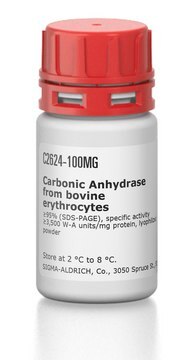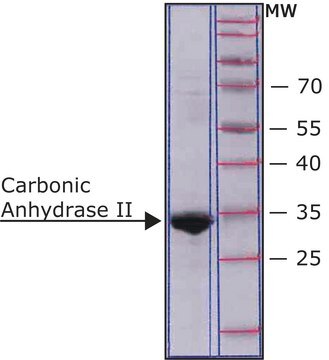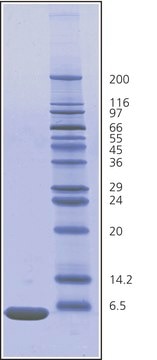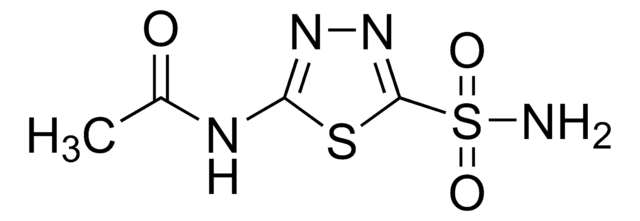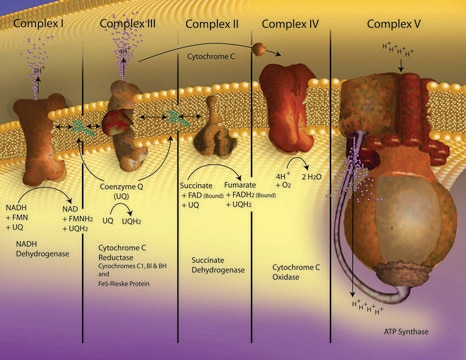C7749
Carbonic Anhydrase II bovine
≥90% (SDS-PAGE), recombinant, expressed in E. coli, ≥5,000 units/mg protein, buffered aqueous solution
Anmeldenzur Ansicht organisationsspezifischer und vertraglich vereinbarter Preise
Alle Fotos(1)
About This Item
Empfohlene Produkte
Rekombinant
expressed in E. coli
Qualitätsniveau
Assay
≥90% (SDS-PAGE)
Form
buffered aqueous solution
Spezifische Aktivität
≥5,000 units/mg protein
Mol-Gew.
~29 kDa
Versandbedingung
wet ice
Lagertemp.
−20°C
Anwendung
Carbonic Anhydrase II bovine has been used as a control in native gel electrophoresis and X-ray absorption spectroscopy characterization of Thalassiosira weissflogii carbonic anhydrase 1.
Carbonic anhydrase is used to create carbon dioxide capture systems and to research various purification techniques . Carbonic anhydrase is also used to study acid-base regulation in fish and carbonic anhydrase type II deficiency syndrome . Product C7749, Bovine carbonic anhydrase II (CA II), has been widely used as a model protein in the investigation of the protein folding process.
Biochem./physiol. Wirkung
Carbonic Anhydrase is a zinc-containing enzyme that catalyzes the reversible conversion of carbon dioxide to bicarbonate. One of its main physiological roles is to maintain the acid-base balance in blood and other tissues. Lack of carbonic anhydrase results in carbonic anhydrase type II deficiency syndrome, which is an autosomal recessive disease that causes osteopetrosis, renal tubular acidosis and brain calcifications . Carbonic anhydrases are metalloenzymes since most active sites contain zinc. Carbonic anhydrases are widely distributed in plant and animal tissues where they are involved in diverse physiological processes, such as photosynthesis, pH homeostasis, calcification, and bone resorption. The enzymes can be localized in the cytosol or mitochondria, be membrane bound with extracellular domains, or be secreted. Bovine carbonic anhydrase II (CA II) is a cytosolic, single-chain, approximately 29 kDa enzyme.
Einheitendefinition
One unit will decrease th pH of a 20 mM tris buffer from pH 8.3 to 6.3 per minute at 0 °C.
Physikalische Form
Supplied as a solution in 20 mM Tris, pH 7.6, with 150 mM NaCl.
Lagerklassenschlüssel
10 - Combustible liquids
WGK
WGK 1
Flammpunkt (°F)
Not applicable
Flammpunkt (°C)
Not applicable
Analysenzertifikate (COA)
Suchen Sie nach Analysenzertifikate (COA), indem Sie die Lot-/Chargennummer des Produkts eingeben. Lot- und Chargennummern sind auf dem Produktetikett hinter den Wörtern ‘Lot’ oder ‘Batch’ (Lot oder Charge) zu finden.
Besitzen Sie dieses Produkt bereits?
In der Dokumentenbibliothek finden Sie die Dokumentation zu den Produkten, die Sie kürzlich erworben haben.
Kunden haben sich ebenfalls angesehen
The active site structure of Thalassiosira weissflogii carbonic anhydrase 1
Cox EH, et al.
Biochemistry, 39(40), 12128-12130 (2000)
Joana da Costa Ores et al.
Chemosphere, 88(2), 255-259 (2012-04-20)
This work presents a study of industrially applicable techniques to obtain a biologically supported carbon dioxide capture system, based on the extraction of carbonic anhydrase from bovine blood. Carbonic anhydrase is a metalloenzyme which catalyzes the reversible hydration of carbon
K M Gilmour et al.
The Journal of experimental biology, 212(Pt 11), 1647-1661 (2009-05-19)
Carbonic anhydrase (CA) is the zinc metalloenzyme that catalyses the reversible reactions of CO(2) with water. CA plays a crucial role in systemic acid-base regulation in fish by providing acid-base equivalents for exchange with the environment. Unlike air-breathing vertebrates, which
Thomas M Bosley et al.
Brain : a journal of neurology, 134(Pt 12), 3502-3515 (2011-11-29)
Carbonic anhydrase type II deficiency syndrome is an uncommon autosomal recessive disease with cardinal features including osteopetrosis, renal tubular acidosis and brain calcifications. We describe the neurological, neuro-ophthalmological and neuroradiological features of 23 individuals (10 males, 13 females; ages at
Xiuhong Shan et al.
Journal of computer assisted tomography, 37(1), 22-28 (2013-01-17)
The objective of this study was to investigate the correlation between the degree of necrosis displayed in computed tomography (CT) image and the expression of hypoxic and angiogenesis biomarkers of breast cancer. Forty-four breast cancer cases were examined with CT
Unser Team von Wissenschaftlern verfügt über Erfahrung in allen Forschungsbereichen einschließlich Life Science, Materialwissenschaften, chemischer Synthese, Chromatographie, Analytik und vielen mehr..
Setzen Sie sich mit dem technischen Dienst in Verbindung.
